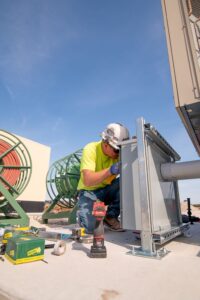06.15.2023
Electrical Safe-Work Practices
Co-authored by Eric Dorn, Faith Technologies project manager.
 The National Fire Protection Agency (NFPA) 70E standard was first published in the year 2000 following a number of serious incidents across the country involving workers being exposed to electrical arc faults. Since the release of NFPA 70E, companies have been required to implement NFPA 70E codes into their safety program to ensure the continued safety of their workers. How do companies continue to focus on overall electrically safe work practices while incorporating NFPA 70E?
The National Fire Protection Agency (NFPA) 70E standard was first published in the year 2000 following a number of serious incidents across the country involving workers being exposed to electrical arc faults. Since the release of NFPA 70E, companies have been required to implement NFPA 70E codes into their safety program to ensure the continued safety of their workers. How do companies continue to focus on overall electrically safe work practices while incorporating NFPA 70E?
At Faith Technologies, we take a holistic approach when working with clients to address both electrical safe-work practices and NFPA 70E. One item that we feel is best practice is field verification of installed systems. Field verification means that a technician not only maps out the entire electrical system, but also verifies that the final system was built per construction drawings/one-lines and that there haven’t been major changes from the initial plan. To meet the NFPA 70E guidelines, we execute an engineering effort to understand what the available incident energy is at each piece of equipment. Utilizing the engineering data, a PPE label is created to help guide qualified staff on understanding the risk associated with that specific piece of equipment, along with the personal protective equipment (PPE) required to keep them safe in the event of an incident.
What happens when a system isn’t field verified?
Gaps within an electrical safety program can be created when information is not field verified. This can lead to inaccurate engineering, resulting in PPE labeling that may misguide the qualified staff in the proper PPE needed. This could potentially lead to them being underprotected and vulnerable to injury.
Each year, OSHA releases the top 10 safety violations for the previous fiscal year. Inadequate lock-out/tag-out (LOTO) procedures were number six for fiscal year 2022, up one spot from 2021. Since LOTO is so important to performing safe electrical work, Faith Technologies has always tied this into our PPE labels. This helps simplify the process of establishing a safe work condition for the qualified team member(s).
Within construction projects, many times the drawings are not detailed enough to show physical locations of circuit breakers within panels. Other times, plans change, and circuit breakers or feeders are moved around within a panel, or even to other panels. Field verification of the final system is critical to ensuring accurate LOTO information on the system labeling.
The importance of field verification is often overlooked within the industry, with construction scopes of work having a stronger focus on engineering/design pieces such as short circuit assessment and coordination, etc. In the midst of your construction projects, don’t lose focus on one of the main intentions the arc flash PPE label is designed for: keeping your team members safe!
If you enjoyed this blog article, please subscribe to stay up to date on the latest industry news from our experts at Faith Technologies.



